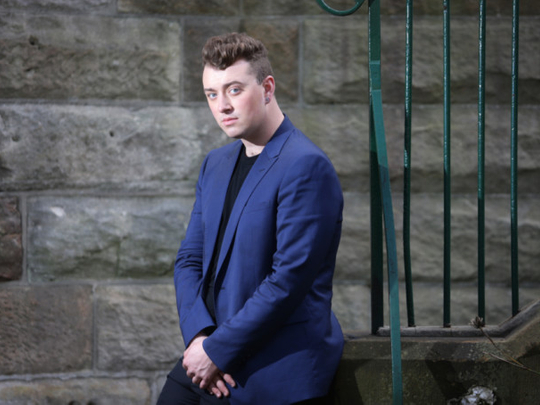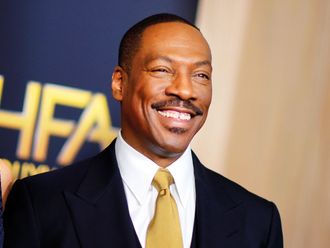
Sam Smith is staring up at the top of a block of flats in Limehouse, east London. “See, that’s where I lived two years ago; £600 (Dh3,676) a month rent I used to pay. I was working full-time in a bar Monday to Sunday, all the hours I could, and I’d walk home because I couldn’t afford the tube.”
And now? I’m waiting for the singer-songwriter to tell me about his Mayfair penthouse. “Now? My current flat? Oh that’s cheaper — £500 a month.” He seems to be holding back. Go on, I say. “I got burgled a few weeks ago, so now I’m actually homeless. I’m trying to find a place to live.”
Smith’s status is changing by the day. When we first arranged this interview, he’d just had two massive solo hit singles in Britain. A week before we met, his album had gone into the US charts at No 2 the highest ever entry for a debut by a British singer. A day after we meet, his single is No 1 in America. The following day he performs live, and is joined on stage by Mary J Blige.
At 22, he is on the verge of being absurdly wealthy, but isn’t quite yet. For now, his dream is to return to Limehouse and buy a flat.
You may think you’ve not heard of Sam Smith, but you’ll almost certainly have heard him. His sweet, soulful falsetto is everywhere this summer — the gospelly Stay With Me and doleful funk of Money On My Mind pound from radios, pubs, clubs and gyms up and down the land. Then there are the dance hits he featured on, which have been given a new lease of life: Disclosure’s Latch and Naughty Boy’s La La La.
From a distance, Smith looks more like an HGV driver than a pop star. He’s a big lad with an even bigger quiff, but close up his features are surprisingly delicate. You’d expect him to be a product of the Brit school or the X Factor, but actually he’s just a product of his own drive.
Smith’s management appears to be marketing him as the male Adele. It makes sense they do have much in common. Adele’s guitarist Ben Thomas plays in Smith’s band; Adele collaborators Fraser T Smith and Eg White have written and produced on Smith’s album In The Lonely Hour; both defy the size-zero cut-and-paste pop star stereotype. Most importantly, for both artists the voice is paramount.
Unrequited love
Do the comparisons create a pressure? “No. No way. The thing I take from the Adele stuff is the honesty, the fact that she just sings from her heart, because my music is completely different.”
Like Adele’s first album, 19, In The Lonely Hour is a classic soul-barer — a semi-autobiographical account of unrequited love in which he begs the object of his affections to leave his lover, dreams he is mugged outside his beloved’s house, begs for a one-night stand and defiantly claims nobody will love him like he can. Sometimes it feels like heartbreak by numbers; at others it is a powerfully felt personal statement. What is refreshing about In The Lonely Hour is that Smith doesn’t make a drama about the fact that it’s dedicated to a man. There is also a touching innocence to it — he wrote it for young people yet to experience reciprocal love.
It has been widely reported that earlier this year Smith “came out” in the New York-based magazine the Fader. But he says this is ridiculous — he had never been in, and it was the first time he’d been asked about his sexuality. “I didn’t come out. I came out when I came out of my mum! No, that side of things to me is just normality. I find it weird when people use the expression ‘coming out’ like it’s a massive party of relief.”
He first made headlines when he was 16 years old — but not in a way he likes to remember. In 2009, the Daily Mail reported that city trader Kate Cassidy was suing City bonds and currency broker Tullett Prebon for £1.5 million for unfair dismissal after being sacked for, allegedly, spending part of her working day managing her son Sam’s career. It’s a story that scarred Smith, but one that he says also helped prepare him for the world of celebrity.
We head off to the pub, and he tells me how reluctant he was to move out of his £500-a-month flat. When he came home after a day in the studio or promoting his career in the US, it was a great reminder of how quickly things can go tits-up. “It’s proper rundown. It’s good and humbling.” So he likes living in squalor? He belly-laughs and slaps his thigh. “No. Nonono. I grew up in an amazing house”. Then he corrects himself before he’s finished his sentence. “Actually, saying that, till the age of four I lived in a tiny two-bedroomed house.”
Private lessons
Which takes us back to his mother. He adores her, says she is his hero. Cassidy started her working life as a Barclays bank clerk in Islington and ended up as a City trader earning £500,000 a year. Family life was transformed: they moved into the big house in Cambridgeshire, built a conservatory and a pool. Meanwhile, Smith started singing at the age of eight, often in front of his parents’ friends when they had guests, and by nine he was having private lessons with the jazz singer-songwriter Joanna Eden. “The first thing I sang in a lesson was Come Fly With Me by Frank Sinatra.”
The Sinatra influence is obvious. His album title nods to Sinatra’s melancholy classic In The Wee Small Hours. By the age of 13 Smith had his first manager and was mapping his route to world domination. Then his mother was sacked from her trading job, and it was a reality check for the whole family: they lost their money, discovered close friends weren’t so close after all, and Smith became a little bit cynical.
“It’s made me a very paranoid person now. Even now I get paranoid if one of my team doesn’t reply or seems angry with me — I’m like, oh no, that’s it.”
We’re sitting in the pub garden, and he’s scanning the menu, segueing between the iniquities of investment banking and the prospect of an afternoon feast. “I love food. What d’you want?” I leave the ordering to him. “I’m not eating carbs. So should we get squid, olives, sausage, ham, and we’ll share, yes?”
Smith says he gets upset when it’s reported that he had a moneyed childhood, because it’s not the whole story. “The climb to money was sudden. We were doing nicer things, building, travelling around the world. But just as quick as the climb was the decline. We’re in a whole different situation. So I actually get really angry when I hear people say I come from money, because when I was younger I had money and then I didn’t. So I really do know more what it’s like to be poor than I know what it’s like to be rich.”
I ask if his mother won her claim for constructive dismissal. “I won’t go into that.” The important thing, he insists, is that the claim was unfounded. His mother never had the time or inclination to manage his burgeoning career. “My dad, bless him, is the one who should get credit for that. Every day after school he would drive me to Kilburn where I’d be recording in studios.” His father had worked on the fruit-and-veg market in Fulham, but gave it up to dedicate himself to his son.
Smith is piling away the tapas, and extolling the wonders of food. “I think I prefer food to singing. It’s really bad, isn’t it? Food is my favourite thing in the world. I always say if I ate what I actually wanted to eat I’d be in one of those electronic scooters because I’d be too big.” He giggles. Has he got a history of overindulging? “I was a very big teenager. Well, massive actually.” Again he changes his mind mid-sentence. “Well, not massive, but big. My dad basically became a fitness trainer to help me. He took courses and started to train me, and taught me how to eat better.”
His father’s side of the family was skinny, his mother’s side large. “I take after my mum’s side I was very self-conscious about it. I’m on a diet now. I’m always going to have issues with my weight.” He sips at his glass of white wine, and talks about how his father made him go jogging. “We did loads of running. All the stuff you hate, he tried to make me do. He took out all the fizzy drinks, all the chocolate, all the bad foods in the house, which was unfair on my two sisters because they have a different body type to me.”
His parents split up when he was 18, which is when he went to London to make his fortune. A year later, he was cleaning toilets in a London bar, had just had fallen out with his sixth manager (from whom he was renting a room in the flat down the road) and was beginning to despair. He wrote a self-pitying song called Little Sailor, about a young man who dreamed of a career in music and was getting nowhere. “I was basically saying, I give myself one more year to do this, then I give up.”
How could he even think of giving up at 19?
“Remember, I started when I was 13,” he says. “I was 19, and all my friends were at university and travelling and I was stuck in London cleaning toilets, and I’d already had six managers, and I was like, no, if it doesn’t happen next year I’m going to leave and travel and see the world.” And then? “I would have opened up a flower shop in Italy.” Do you know anything about flowers? “No. I used to love going to the garden centre as a kid. It made me feel relaxed. It would have just been a calm, beautiful life.”
Had you questioned why you’d not made it? “No,” he says. “I’ll tell you what. Deep down in me there was never a question. I don’t want to sound big-headed or horrible, but from day one I had a quiet confidence that everything would be OK.” Did you ever think you’d be too big to be pop star? “Big?” He looks confused. Physically, too big; Smith doesn’t have the typical boy-band physique. “Yeah! 100 per cent.” Perhaps post-Adele young music fans are less prescriptive about what their idols should look like. He nods. “People like real life. Why do people like all this crap television out there? Because you’re looking at what you can relate to. And music should be speaking about things you can relate to. That’s the key. I can’t relate to skinny, perfectly sculptured, tanned men singing about gold chains and Ferraris because I’m not that way.”
We’re joined in the pub by a handsome man called Elvin Smith. It turns out Elvin is manager No seven, and used to be to be a singer himself, performing as Elviin.
“Sorry guys, did I interrupt?” Elvin says.
“No,” Smith says. “I just told him I was a fat kid!”
Beginnings
Smith credits Elvin with turning his career around. How did they meet? Ah, says Smith, it’s along story. “I was at an Adele concert, front row, Elvin was supporting her and I heckled him.” Was he terrible? “No. He’s got a gorgeous voice. He said something like, ‘This song is for someone I love,’and I said, ‘Ah, thanks!’ It was a nice heckle. Not abuse.”
When Smith sobered up he was embarrassed, so that night he contacted Elvin on Myspace to apologise. They had no further contact for three years. “Then I went to a gig in King’s Cross and saw him there. I walked up to him and said, ‘You’re Elvin, I saw you support Adele, I heckled you.’ He was like, ‘You’re Sam Smith, I remember speaking to you on Myspace.’ And he was like, ‘I’m a manager now.’ It was too much of a coincidence.”
So he asked Elvin to manage him? God no, Smith says. He said nothing. Later that evening he was outside the venue having a cigarette when Elvin walked past on his way home. “Something in my head told me, you’ve just got to go for this, and I ran down the street and said, ‘What’s your email? I want to send you a song.’”
Elvin introduced him to the songwriter Jimmy Napes, who co-wrote much of Smith’s album. Napes’s manager also handled the electronic music duo Disclosure, and they asked Smith to record Latch with them.
Smith got himself an extra couple of managers (Nos 8 and 9) to work alongside Elvin and everything began to fall into place. In late 2012 Latch charted, then last year Smith guested on producer Naughty Boy’s La La La, which was the UK’s fifth-bestselling single of 2013. At last he was successful, but as a pop star he was still invisible he didn’t feature on any of the videos.
In retrospect, it looks like canny marketing: Smith’s management paved the way for his solo success with these prestigious guest appearances. By the time he released his first record as Sam Smith, there was a story to tell and a voice we were familiar with. Money On My Mind and Stay With Me both reached No 1. He won two major prizes: the Brit Critics’ Choice award and the BBC’s Sound of 2014 poll for new artists.
The awards were not without controversy. His detractors said Smith was bland and commercially driven. One critic dismissed him as “another fluid, honey-toned voice sprinkling melodious Americanised soul licks over blends of digital beats concocted by laptop production teams”.
Smith’s music is certainly not challenging, but there is no reason it should be — he has a lovely, warm voice and exercises remarkable control over it. As for his business savvy, he has never pretended otherwise. He recently took over the entire ad break on Alan Carr: Chatty Man to perform Stay With Me live from the Roundhouse as a new form ofcommercial.
He’s still trying to get used to success — and not quite managing. “Things went so badly for so long, and then suddenly it all just goes amazingly. Honestly, I remember waking up one morning and it was all different. Every day it gets a little bit more insane. I get good news every day. I’m so scared for when that’s going stop, if it’s going to stop.”
He is already waiting for the backlash, and is suspicious of the fact that people are now keen to be his friend. “I wonder if they’ll be surrounding me if my next album charts at No104,” he says. “It’s reminding me of that time when my mum had so much money and then all the people she thought were her closest friends disappeared. I’m more wary than anyone about who I surround myself with.”
When he first set his heart on a career in music, his parents told him the important thing was longevity. And he’s already doing his best to ensure that he does stick around. “Even right now I have the title in my head to my second album; I know what it’s going to sound like. I have the idea in my head for the artwork and I also have the idea for the artwork for my third album.”
You’re a freak, I say. “Well, it’s bad. I feel like it’s a curse sometimes. I’m all about the safety net.” Tell me about the second album, I say. “No way!” Just a little hint? “Well, it’s going to be more uplifting I just hope my life is more uplifting when I write it.” How’s your love life now? “Getting there. Yeah! I’m going on dates. I think I’ve got four people on the go! Hahaha!” Really? He looks bashful. “No, I’ve been on four separate dates in the last two months.”
Anyway, he’s got other things on his mind. He’s just about to tour the States, and then he’s got to nail down those plans for world domination. We talk about his mother and the advice she’s offered him about how to cope. “My mum’s ringing every day saying, ‘Are you OK?’ She just wants me to stay soulful.”
Isn’t it difficult to stay soulful when you’re so ambitious? Yes, he says, that is the great challenge. “It’s what I’m dealing with in my head right this moment. I want to be the biggest-selling male pop star in the entire world. I really want that, but at the same time I want to keep this.” He clutches his heart. “I don’t want to lose this.” Surely it’s impossible to have both? He pops an olive in his mouth and smiles. “I’m going to make it possible.”
Sam Smith’s new single, I’m Not The Only One, is out on August 31, taken from the album In The Lonely Hour, out now.









